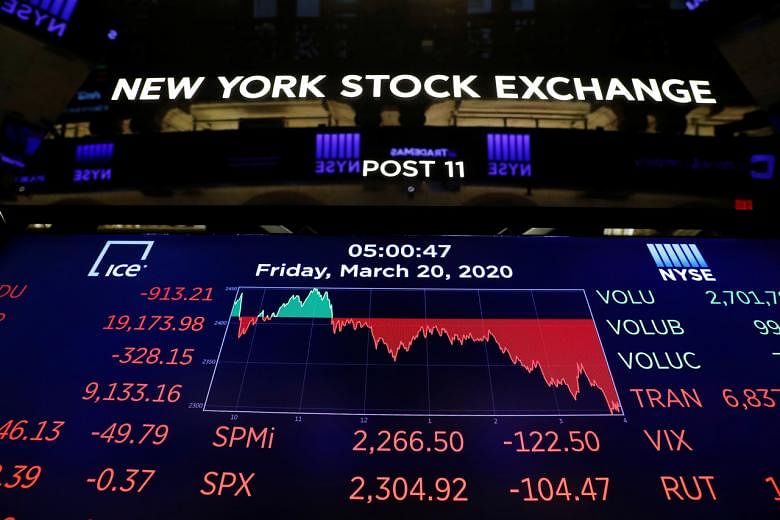We're not just dealing with an economic crisis, say growing numbers of economists, when asked how to respond to the Covid-19 pandemic. This is a war, and it has to be fought on a war footing.
With infection rates rising exponentially and lockdowns, travel bans and social distancing measures spreading everywhere, most economic activities - other than the provision of essential goods and services - have all but stopped.
Economic projections of even just two weeks ago are rapidly becoming obsolete. A global recession is now the baseline forecast. Europe and Japan are almost there already. With unemployment skyrocketing, the US is on track to follow; the majority of economists polled recently by the University of Chicago's Booth School of Business predict a "major recession".
The GDP growth forecast for China this year has been slashed to below 3 per cent - less than half of last year's. Projections of other countries' growth rates are being downgraded. For Singapore, DBS Bank predicts the economy will shrink by 0.5 per cent, the lower-bound of the Government's forecast of minus 0.5 per cent to 1.5 per cent. This, too, may be optimistic.
Four former International Monetary Fund (IMF) chief economists say the only question is how deep and prolonged the global recession will be. The economic shock will be bigger than the 2008 financial crisis, they say, and an economic depression can't be ruled out.
AN AGGRESSIVE RESPONSE
Encouragingly, the response is now aggressive. The Federal Reserve in the United States has cut its benchmark Fed Fund rates to near zero, flooding the market with liquidity, and expanded its bond-buying programme, as has the European Central Bank. Other central banks have also cut rates.
But with monetary policy options almost exhausted, countries have started to unleash their fiscal firepower. Across Europe and East Asia, governments have rolled out massive spending programmes and rescue packages, including loan guarantees for companies.
The US, which passed a US$8 billion (S$11.6 billion) emergency Bill earlier this month focused mainly on health-related spending, is now considering a US$1 trillion package which could include over US$200 billion in loans for troubled firms and cash payments of US$1,200 to every adult and US$500 for every child. There may also be a separate US$1 trillion to help small firms.
All these initiatives seem dramatic and are bigger than those rolled out in response to the global financial crisis. But even they might not be enough.
For example, on the monetary side, ultra-low interest rates and quantitative easing measures will give banks easier access to liquidity. But as economist Danny Leipziger of George Washington University has pointed out - and which has also been borne out by the experience of the euro zone and Japan, where rates have long been negative - it doesn't ensure that banks will increase lending.
On the fiscal side, loans will help tide firms over hard times, but will not replace the losses they will suffer from business shutdowns - and those loans will need to be repaid, which will hurt companies down the road. Loans with partial government guarantees will be more helpful but still inadequate. The experience with such loans is mixed. For example, SMEs in Singapore have pointed out that banks charged them high rates even when the Government guaranteed more than 50 per cent of repayments.
Showering individuals with cash - the "helicopter money" option being considered by the US - will be popular and help them pay urgent bills. But economists like University of California at Berkeley's Emmanuel Saez say it would be poorly targeted - too little for people who lose their jobs and unnecessary for those who don't. Nor would it assure the newly unemployed that they will have jobs to go back to when the pandemic passes and the recession lifts, especially if their firms go bust in the meantime.
INCOME SUPPORT
Some economists favour income-support steps that go beyond one-off transfers. For instance, Professor Leipziger proposes government-supported, interest-free credit card purchases for essentials like food and rent, as well as mandatory mortgage grace periods for those affected by the crisis.
The New York Times financial journalist and author Andrew Ross Sorkin goes further, proposing that the government provide all companies, big and small, as well as self-employed workers, interest-free bridging loans guaranteed for the duration of the crisis, to be paid back over five years. But as a condition, companies must retain at least 90 per cent of their workers at the same wage as before the crisis.
This would keep almost everyone employed and there would be no need for the government to try to pick the losers. This would be difficult anyway - the impact of the crisis will be felt far beyond the so-called "front-line" sectors such as airlines, hotels and restaurants.
It will also affect, for instance, companies that supply fuel to the airlines, laundry services to the hotels and food items to the restaurants, and to their suppliers in turn.
Professor Saez has an even more radical proposal, suggesting the government act as a "buyer of last resort", replacing the demand that evaporates because of the crisis. So, for example, if a business loses 80 per cent of its revenue, the government should replace that lost revenue for the duration of the crisis, on condition the firm does not retrench. It should also compensate the self-employed for lost earnings. This way, firms that were viable pre-crisis will still be so after it, and workers will be able to keep their jobs, even if there is currently no work for them. This would be the best way to ensure the economy will rebound when the crisis is over. Any halfway measures would not be able to prevent mass liquidations and large-scale job losses.
NEVER MIND THE COST
Such a scheme would be costly. Prof Saez estimates that for the US, if demand falls by 40 per cent over three months, it would lead to a loss of 10 per cent in annual GDP. That's what it would cost the government. That is huge, but would need to be weighed against the future cost arising from mass bankruptcies and layoffs.
At this time of crisis, cost should be a secondary consideration.
As former IMF chief economist Kenneth Rogoff noted: "The whole point of having a sound government balance sheet is to be able to go all-out in situations like this, which is tantamount to a war. Countries that are not able to do this will suffer not just in the short run, but in the long run."
Whatever the policies chosen, the best advice is to think big and err on the side of excess, not caution. This is a dangerous and uncertain time. The costs of overreacting, essentially a temporary blowout of budget deficits, would be small against the risks of under-reacting - a destruction of the economy's productive capacity and large-scale unemployment.
Hopefully, Singapore's policymakers will pull out all the stops, effectively launching a second Budget focused solely on cushioning the economy from the dangers ahead. If this means drawing on past reserves, so be it. Our reserves are supposed to protect us against the proverbial rainy day. What we are facing now is much worse than even a thunderstorm. It's a war.












